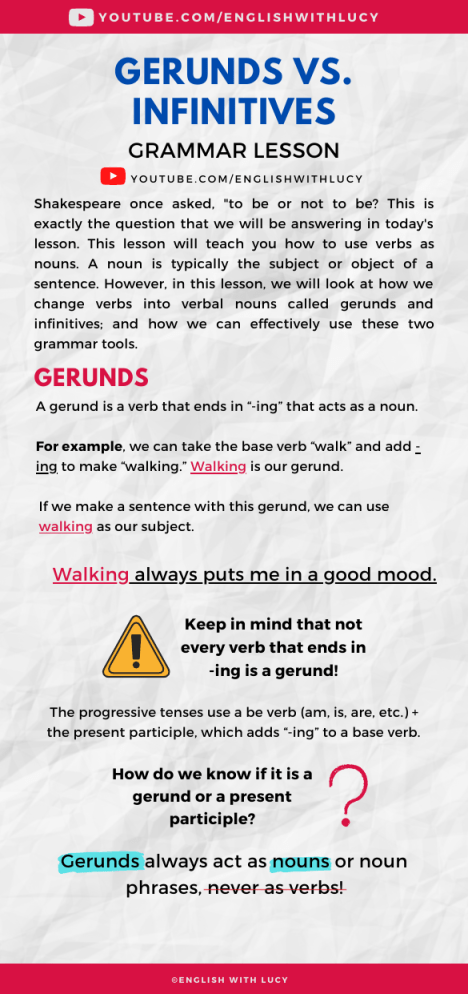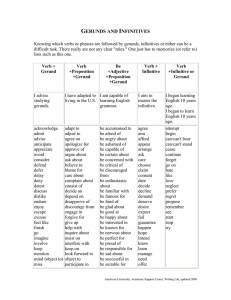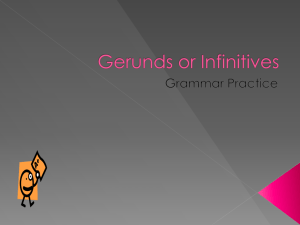
YOUTUBE.COM/ENGLISHWITHLUCY GERUNDS VS. INFINITIVES GRAMMAR LESSON YOUTUBE.COM/ENGLISHWITHLUCY Shakespeare once asked, "to be or not to be? This is exactly the question that we will be answering in today's lesson. This lesson will teach you how to use verbs as nouns. A noun is typically the subject or object of a sentence. However, in this lesson, we will look at how we change verbs into verbal nouns called gerunds and infinitives; and how we can effectively use these two grammar tools. GERUNDS A gerund is a verb that ends in “-ing” that acts as a noun. For example, we can take the base verb “walk” and add ing to make “walking.” Walking is our gerund. If we make a sentence with this gerund, we can use walking as our subject. Walking always puts me in a good mood. Keep in mind that not every verb that ends in -ing is a gerund! The progressive tenses use a be verb (am, is, are, etc.) + the present participle, which adds “-ing” to a base verb. How do we know if it is a gerund or a present participle? Gerunds always act as nouns or noun phrases, never as verbs! ©ENGLISH WITH LUCY YOUTUBE.COM/ENGLISHWITHLUCY EXAMPLES GERUND Jenny enjoys walking. Walking is acting as the object of this sentence, what does Jenny enjoy? Walking. PRESENT PARTICIPLE Jenny is walking right now What is Jenny doing? She is walking. Walking is acting as our verb. INFINITIVES We also use infinitives to create verbal nouns. An infinitive is the simplest form of a verb. To make an infinitive, we place “to” in front of the verb. Infinitives are sometimes called “to infinitives.” Let’s take our verb “walk.” To create an infinitive, we add “to" and we now have to walk. If we use the infinitive to walk in a sentence, it would look like this: She expected to walk right in. GERUNDS AND INFINITIVES AS OBJECTS OF A SENTENCE GERUNDS The basic form of a sentence in English is: subject + verb + object When a gerund comes before the main verb in a sentence, it will act as the subject of that sentence. Like our example earlier, walking always puts me in a good mood. Walking is the subject of the sentence. If we replace “walking” with a different noun, like a movie title, Harry Potter always puts me in a good mood. We can see that a gerund can function perfectly as a subject. ©ENGLISH WITH LUCY YOUTUBE.COM/ENGLISHWITHLUCY EXAMPLES Playing the guitar was always his favourite hobby. Baking is a great way to relieve stress. Reading helps me keep my mind sharp. Cheating will never get you anywhere in life! Gerunds are often part of nouns phrases as we can see in the first example; playing the guitar was always his favourite hobby. Playing the guitar is our noun phrase. INFINITIVES Using an infinitive as a subject is a bit different. Using an infinitive often sounds quite formal. We typically only use infinitives as a subject in written English. Swimming gives me great pleasure. the use of a gerund sounds natural To swim gives me great pleasure. the use of an infinitive sounds old fashioned and posh You can use an infinitive as a subject when giving directions, explanation, quoting someone, or a dictionary definition. For example, To cook properly, place the fish skin side down. To get there, take the bus to the highstreet and then cross the road. GERUND OR AN INFINITIVE AFTER CERTAIN VERBS Certain verbs allow the use of a gerund or an infinitive. Please see the examples on the following page. ©ENGLISH WITH LUCY YOUTUBE.COM/ENGLISHWITHLUCY Gerund Infinitive She hates sleeping late. She hates to sleep late. We prefer eating at home. We prefer to eat at home. They started to work They started working on on the project at the project at school. school. The car needs cleaning. The car needs to be cleaned. Gary tried working from Gary tried to work from home, but didn't like it. home, but didn't like it. WHEN AND HOW TO USE GERUNDS There are certain verbs that are only followed by gerunds. The gerunds in these sentences function as a direct object. Verb Consider Example He considered moving to Spain last year. Deny Jack denied cheating on his test. Enjoy Wendy enjoys watching movies at the weekends. Imagine We imagined waking up to a beautiful sunrise. Suggest Dan suggested bringing home a rescue dog. We can also use the verb “go” + a gerund when talking about hobbies or other recreational activities. Go hiking Going swimming Went sightseeing Go fishing Going shopping Went snorkelling ©ENGLISH WITH LUCY YOUTUBE.COM/ENGLISHWITHLUCY GERUNDS AS THE OBJECT OF A PREPOSITION Another common use of gerunds is to use them after prepositions. Let’s look at some common prepositions and how we can use them with a gerund. Preposition before by since Example Even before completing university, he already had many job offers. By going to bed early, I am ready for my morning runs. I have been thinking of him nonstop since meeting him. except He hates all forms of creative expression except writing. without We decided to take a trip without planning. after After recovering from his injury, Will retired from rugby. WHEN AND HOW TO USE INFINITIVES Just like gerunds, infinitives follow certain verbs. The infinitives will function as the direct objects of these sentences. Let’s look at a few examples: Verb Agree Example We agreed to never speak to each other again. Demand They are demanding to change their flight. Manage He managed to sell his house after only three days on the market. Plan She is planning to quit her job after she returns from holiday. Want Ben wants to travel to London by train. ©ENGLISH WITH LUCY YOUTUBE.COM/ENGLISHWITHLUCY INFINITIVES AFTER VERB + OBJECT COMBINATIONS There are also instances when we use an object after a verb. We will use an infinitive after these objects. The sentence pattern will be: Subject + verb + object + infinitive They asked us to help with washing up. She told him to bring home dog food. He encouraged her to follow her dreams. INFINITIVES AFTER ADJECTIVES We can also use infinitives after adjectives. Let’s take a look at some examples: He was happy to include her in the new project at work. They were sad to leave the island at the end of the holiday. We are pleased to welcome you into our home! QUICK TIP! If you are still unsure of when to use a gerund or infinitive, there is a little trick that can help you. Just keep in mind that it doesn’t work in EVERY situation. When to use an infinitive: If the first action leads to the second action, we use an infinitive. He wants to eat pizza for dinner. When to use a gerund: If the first action is happening at the same time as the second action, we use a gerund. He likes eating pizza for dinner. ©ENGLISH WITH LUCY YOUTUBE.COM/ENGLISHWITHLUCY Activity Choose the correct verbal noun for each sentence. 1) Rachel forgot ________________ out the rubbish out last night. a. to take b. to taking out c. taking 2) She disliked _________________ in school, but now she loves it! a. to reads b. reading c. to reading 3) He avoided __________ to the doctor for months. a. go b. going c. to go 4) We pretended ____________ the food when my mum walked in the room. a. to likes b. to liking c. to like 5) I finished _____________ that book yesterday. Do you have any others you recommend? a. to read b. to reading c. reading 6) You started _______________ Italian last month? That is amazing! a. to learning b. learning c. to learns 7) We enjoyed ______________ you last week. Let's do it again soon! a. to see b. seeing c. to seeing 8) He hates ___________________ out of work. a) calling b) to calling c. calls 1) a 2) b 3) b 4) c 5) c 6) b 7 b 8) a The End ©ENGLISH WITH LUCY

